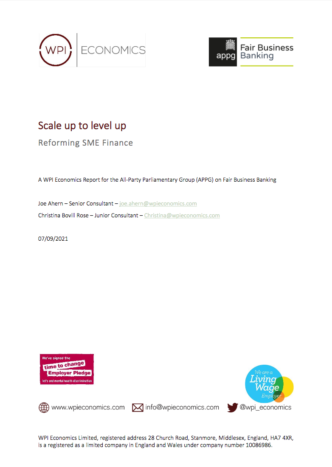Close £22bn business funding gap to make levelling-up reality, say MPs
 A multi-billion pound funding gap for small businesses is preventing the UK from “levelling-up,” according to an in-depth, cross-party Parliamentary inquiry.
A multi-billion pound funding gap for small businesses is preventing the UK from “levelling-up,” according to an in-depth, cross-party Parliamentary inquiry.
The “Scale Up to Level Up” report, published today (07.09.2021) by the All-Party Parliamentary Group (APPG) on Fair Business Banking, describes a critical shortage of finance to many SMEs and a lack of trust between banks and businesses.
It says the acute lack of finance restricts business growth and is a particular barrier to the government’s ambition to “level up” and address regional inequalities in opportunity.
And it finds that concentration, centralisation and the lack of relationship-based banking within traditional SME banking cause problems for all small and micro businesses (99% of the UK’s businesses), but these are especially acute for BAME-led and women-led businesses.
The report finds solutions are available immediately to Government and policymakers. Its principal recommendation draws on the extensive track record of Community Development Finance Institutions (CDFIs), which currently lend around £200m annually to businesses which are creditworthy but excluded or under-served by mainstream lenders.
CDFIs “already address specific gaps in the business finance market,” the report finds, and lend disproportionately more to under-served groups, such as BAME-led and women-led businesses and in areas of higher deprivation.
The report calls on Government to:
“Deliver a strong local finance option for every business in the UK – by providing capital to regionally based CDFIs and mutual banks which they will then multiply by lending to thousands of local businesses.” It adds that “in the longer term, a mandated portion of bank lending should come through CDFIs in order to allow them scale their offerings further.”

“CDFIs have a unique ability to grow businesses and create jobs in communities desperate to level-up,” said Theodora Hadjimichael, CEO of Responsible Finance which represents the UK’s 50 CDFIs. “9 out of 10 of the businesses we lend to have been turned down for bank finance, and our borrowers create tens of thousands of jobs and go on to become banks’ future customers. CDFIs spot and nurture talent, helping fantastic businesses led by entrepreneurs who are under-served by mainstream finance to realise their potential. No other financial institutions unlock opportunities for people and places starved of investment like CDFIs do.”
The APPG is a cross-party group with members from the House of Commons and the House of Lords. It makes policy recommendations to Government that encourage a finance system which allows enterprise to flourish and business to thrive.
Its inquiry has taken evidence from a wide range of stakeholders including business owners and business representative groups, high street and challenger banks, non-bank lenders including community development finance institutions, regulators, HM Treasury and BEIS ministers and officials and the British Business Bank.
Its “Scale Up to Level Up” report is an urgent reminder that to make “levelling-up” meaningful across the UK, which has one of the most regionally unequal economies and societies in the G7, it is crucial to boost the role played by a more relationship-based model of banking and finance. This, it says, will improve the resilience of UK businesses, the economy and communities across the country.
Theodora Hadjimichael of Responsible Finance added:
“Access to finance remains the major block to SME growth in the regions, deprived areas and among demographics under-served by mainstream and so-called challenger banks. And levelling-up will not be delivered solely by building projects in red-wall constituencies.
“The Government can and should give the SME finance market an adrenalin shot to break down the barriers stifling small businesses by committing £50m per year in new, first loss capital to CDFIs for five years.
“This will lever millions of institutional investment on top and enable CDFIs to lend over £1.1bn more to small businesses in the regions and among demographics currently under-served. It will support over 33,000 businesses and create nearly 70,000 jobs, many in deprived areas.
“CDFIs have smashed previous Government targets for lending and job creation across the regions. With CDFIs’ help, the UK can make levelling-up a reality for businesses and communities.”
Case study
Rossington-based Laser Additive Solutions launched in 2014 and delivers a wide range of projects on behalf of the aerospace, energy and transport sectors. Its growing client base includes Siemens and Rolls Royce.
Last autumn it was appointed as the lead member of a research and development consortium to investigate this technology can minimise risk and save costs in high-tech construction.
This required a significant investment in raw materials, and a special facility within the company’s headquarters to house the equipment used during the programme. Founder Peter Brown turned to Finance For Enterprise, a Doncaster-based CDFI, for help. Their £105,000 loan helped cover a substantial portion of the cash required and Laser Additive Solutions has now built a new laser process cell, which will be used as part of its research and development programme, as well as creating two new highly-skilled jobs.
Praising the support, Mr Brown said: “As the sector we’re working in is a relatively new one, historically, this presented its own challenges when it came to raising the vital funds we needed to purchase the necessary equipment.”
About CDFIs
Community Development Finance has already been endorsed by politicians across party boundaries for its extraordinary impact. Earlier this year, Paul Scully, Minister for Small Business, said “I value the work that CDFIs do around the country – the core value of CDFIs is their focus on the customer as a person, understanding their circumstances and supporting their potential.”
Pat McFadden, Labour MP for Wolverhampton, said “as we try to recover from Covid we need all parts of the financial system firing on all cylinders and I believe CDFIs have a really important part to play.”
Baroness Susan Kramer, a Liberal Democrat Peer, said “I’m a passionate supporter of CDFIs, only they can understand local issues in such a way as they enable community development.”
And Danny Kruger MP said, “We need lenders whose interests align with those of the community as a whole…CDFIs are more flexible, don’t have blanket lending policies and can apply real human judgement to the decisions they make about lending. After 2008 the credit crunch meant lending to small and medium sized enterprises and social enterprises really contracted and we’ve got to avoid that happening in the aftermath of Covid. We’ve got some brilliant providers in this country and I hope the Government and capital system will get behind them.”
Figures show that between 2019-2020 CDFIs lent £263m to 5,887 businesses, creating and supporting over 12,000 jobs, unlocking business growth and job creation, enabling social enterprises to continue delivering vital public services, and keeping viable firms afloat as they responded to the challenges of 2020.
The All-Party Parliamentary Group (APPG) on Fair Business Banking’s “Scale Up to Level Up” report is available here.
Theodora Hadjimichael or Peter Udale of Responsible Finance are available to comment. Call Jamie Veitch on 07904 272 200.
